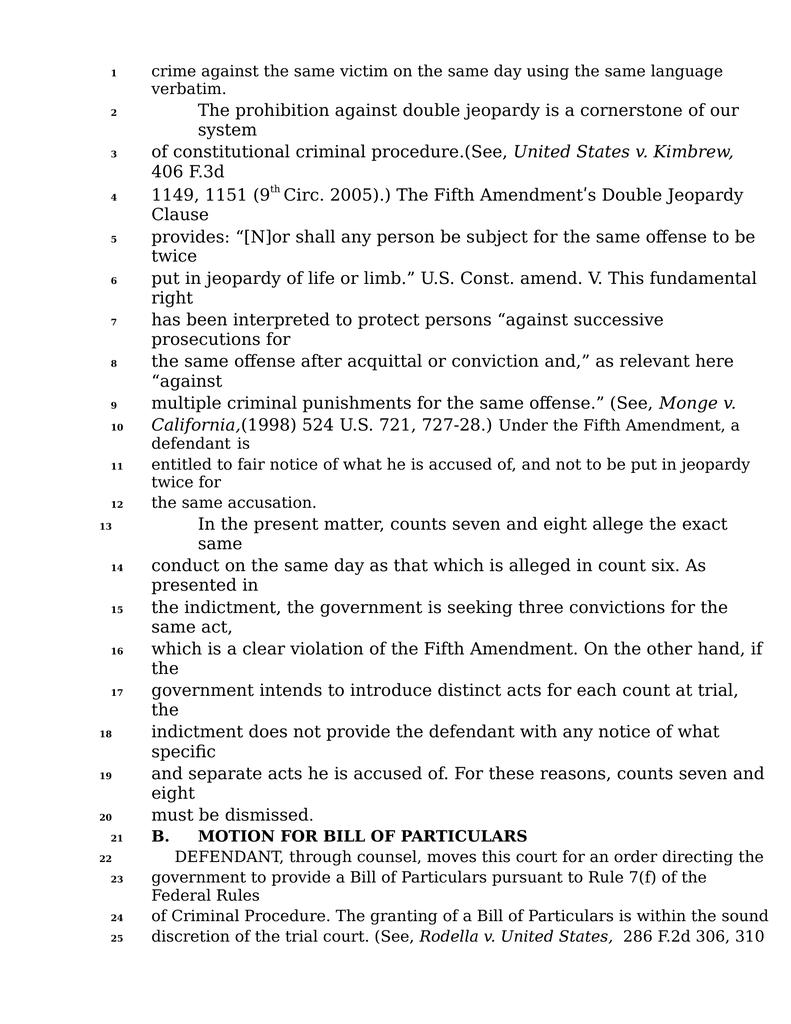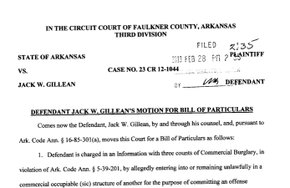

- Motion for bill of particulars in criminal cases code#
- Motion for bill of particulars in criminal cases trial#
A Bill of Particulars calls for an exposition of the facts that the prosecution intends to prove and limits the proof at trial to those areas described in the bill. The purpose of this motion is to compel the district attorney to specifically spell out the underlying details alleged to have been committed within each offense charged. What Does a Bill of Particulars Accomplish?Īccording to the Colorado Rules of Criminal Procedure, Rule 7 (g), a Defense Attorney can file a motion for a Bill of Particulars. In this situation, the defense attorney can strike back by filing a motion for a Bill of Particulars. The defendant should never be made to face a complaint containing duplicative and repetitive language. The numerous counts with repetitive language are extremely difficult to defend against. The defendant, who is overwhelmed by all of the charges, is put in a position of having to guess just what the district attorney is even alleging took place. She said in her story that she just could not remember how many times she was touched, but what do you want to bet that her story will change and by the time we go to trial she will change her story and miraculously have a very specific detailed memory? Do you think we will ever learn about all the sessions she has with the State paid counselor? Do you think that counselor stays on the State approved list if she does not “help” the prosecutors?

This is especially true in sex offense cases.įor example, in a recent case, a client was charged with one count of touching a girl 8 years ago (she is now 21 years old), yet the girl claimed he touched her an “unknown” amount of times. In many cases, a favorite prosecution tactic is to file a complaint containing numerous counts where each count contains identical language. Let’s take a moment to discuss what this is and how it could help your case if you’re charged with a crime in the state of Colorado. When you have a defense attorney who’s intimately invested in his or her clients’ rights, they may opt to file a motion for a Bill of Particulars. A motion for bill of particulars can be particularly helpful in sex abuse cases, especially those involving children.In Colorado, there is a powerful legal tool that’s often misunderstood and underutilized. A motion for bill of particulars is important for the defendant to be able to properly lodge a defense to the criminal charge(s) and to protect against another prosecution for the same offense. A court may grant the motion when the charge and the minutes do not inform the defendant of the specific acts he or she is accused of. The bill’s purpose is to provide additional information, which the Trial Information and the minutes do not provide. A motion for bill of particulars is request for a more specific statement of the details of the crime(s) that have been charged. In that situation, the defendant may want to file a motion for bill of particulars with the court. Sometimes, the Trial Information does not contain specific enough information to inform the defendant of the charge(s) against him. The Trial Information must be accompanied by the Minutes of Testimony, which lists the witnesses for the State and a summary of what each witness is expected to testify at trial.
Motion for bill of particulars in criminal cases code#
The Trial Information must inform the defendant of the name(s) of the crime(s) he or she is charged with, the Iowa Code section(s) defining the crime(s), when the alleged crime(s) occurred, and the elements of the crime(s) charged. When a defendant is charged with a crime in Iowa, the State must file a Trial Information, which is the formal charging document for all indictable misdemeanors and felonies.


 0 kommentar(er)
0 kommentar(er)
